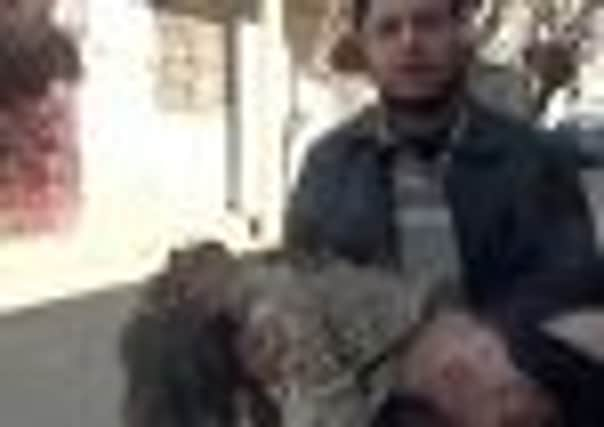Syria: Words and rhetoric amid the bloodshed


Dozens more were killed during the day, according to the opposition, drawing comparison with the plight of Benghazi which triggered Western attacks on Libya last year and accelerating a global diplomatic showdown where the outcome is far from clear.
“I’ve seen whole families killed this week,” an activist called Ahmed said from Homs, the scene of one of the bloodiest government onslaughts in the 11-month-old revolt against Mr Assad. “Now I feel like I’m just waiting to be the next to die,” added the accountant, aged 28.
Advertisement
Hide AdAdvertisement
Hide AdTurkish foreign minister Ahmet Davutoglu said Ankara, which once saw Mr Assad as an ally but now wants him out, could no longer stand and watch and wanted to host an international meeting to agree ways to end the killing and provide aid.


“It is not enough being an observer,” he said. “It is time now to send a strong message to the Syrian people that we are with them,” he added, while refusing to be drawn on what kind of action Turkey or its allies would be prepared to consider.
Syrian army tanks and artillery pounded areas of Homs where revolt had flourished, demolishing buildings where people were living, short of water, food and medical supplies and pinned down by snipers on rooftops.
Syrian state media blamed foreign-backed “terrorists” for killing 30 security personnel on Tuesday and causing an explosion that set a refinery ablaze.
“All the international community should work together to help,” Mr Davutoglu said. “Especially [to help] those who cannot even go from one street to another in Homs. You have pictures of children running from one house to another house while under artillery attack … They cannot continue these methods of oppression.”
Syria’s position at the heart of the Middle East, allied to Iran and home to a powder-keg religious and ethnic mix, means Mr Assad’s opponents have ruled out the kind of military action they took against the isolated Libyan leader Muammar Gaddafi.
Some form of corridors for aid and evacuation, or ceasefire accords inside Syria may be the most achievable demands.
Russia and China, which let the United Nations support the air campaign in Libya, provoked strong condemnation from the United States, European powers and Arab governments when they vetoed a much less interventionist resolution in the Security Council last week that called on Mr Assad to step down.
Advertisement
Hide AdAdvertisement
Hide AdIt is unclear what Turkey, a Nato member and rising Muslim, democratic force in the Middle East, could do to bring Moscow into any international initiative alongside those regional and world powers which have sided with the rebels against Mr Assad.
“Now it is time for diplomatic efforts, and we are using all diplomatic means,” Mr Davutoglu said when asked when Turkey, which has taken in refugees and rebel commanders, might envisage sending its own forces across the border.
Prime minister Tayyip Erdogan, who had described the Russian and Chinese veto at the UN as a “fiasco”, telephoned outgoing Russian president Dmitry Medvedev yesterday and afterward issued a statement repeating that Mr Assad had lost “legitimacy”.
As the diplomatic gears turned, the military offensive in Homs and elsewhere showed no sign of letting up. Activists in the city also accused militiamen of slaughtering three families in their homes – the sort of incident that is fuelling fears of a descent into more widespread, Iraq-style sectarian killing.
The day’s death toll stood at more than 100, activists said, offering figures that could not be independently verified.
Speaking by satellite phone from the beleaguered Bab Amro neighbourhood, activist Hussein Nader said that the bombardment had lessened on the district by dusk but that tanks had moved closer to the district, where 30,000 inhabitants have been without water, electric or telephone lines for days.
He said bombardments has killed 42 civilians yesterday with many others wounded: “There are neighbourhoods on the eastern side of Bab Amro that are disaster zones from heavy shelling apparently designed to open the way for tanks.”